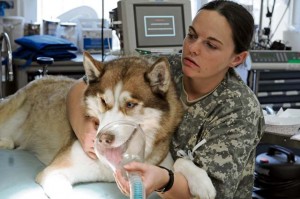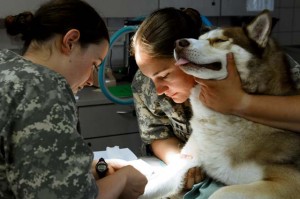
Veterinary care for military working dogs is essential to keeping four-legged warriors “mission ready” both in garrison and downrange.
That’s why the Baumholder, Germany-based 64th Medical Detachment (Veterinary Services) took time recently to brush up on their skills prior to their deployment to Afghanistan. On July 24, Dog Center Europe personnel tested the detachment’s skills and assessed their readiness during training at U.S. Army Garrison Kaiserslautern’s Pulaski Barracks.
Their goal was to hone their abilities in garrison to prepare for the challenges of a deployed environment, said Maj. Kent Vince, an Army veterinarian who is the center’s director.
“It’s imperative that these teams get training in clinical medicine before going downrange,” Vince said. “You never know what they might face when they’re down there.”
Since ancient times, military working dogs were used as front line attackers, guard dogs, scouts and messengers. More recently, they’ve been used to detect explosives. They’ve even been attributed as saving thousands of lives during conflicts in Vietnam, Iraq and Afghanistan.

The Army values its canine corps and specifically trains a dedicated cadre of veterinarians and technicians to take care of the health of these often courageous animals. Members of the 64th said they take every chance they get to work on bettering themselves, said Army Capt. Lindsey Day, a veterinary corps officer.
“This was another opportunity to practice our skills and a chance to work together.” Day said.
Three teams of veterinarians and technicians performed surgeries while being observed and evaluated. Spc. Nicole Lamanna, an Army animal care specialist, said she loves the atmosphere.
“Every chance I get to work in a clinic is amazing,” Lamanna said. “It just shows I can use what I’ve learned under stress.”
Veterinarians also offer first aid training for dog handlers — information that once helped Air Force Staff Sgt. Jonathan Forgham from the 86th Security Forces Squadron, whose canine partner severely injured his head when jumping through a
window.
“We had to rush him across the base to get him to the veterinarian. The whole time I was in the cage with him stopping the bleeding,” Forgham said. “We got to use the training they gave us, and it helped.”
The care veterinary teams offer to working dogs in turn pays off for humans.
“Not only are dogs lives dependent on you, but also humans’ lives,” Lamanna said. “The dogs save lives. So, by saving the dog, we’re saving other Soldiers.”







